At Assange’s extradition hearing in London, Ellsberg fought against the way WikiLeaks’ publication of papers from Manning, similarly to the Pentagon Papers, had became demonized and then criminalized.
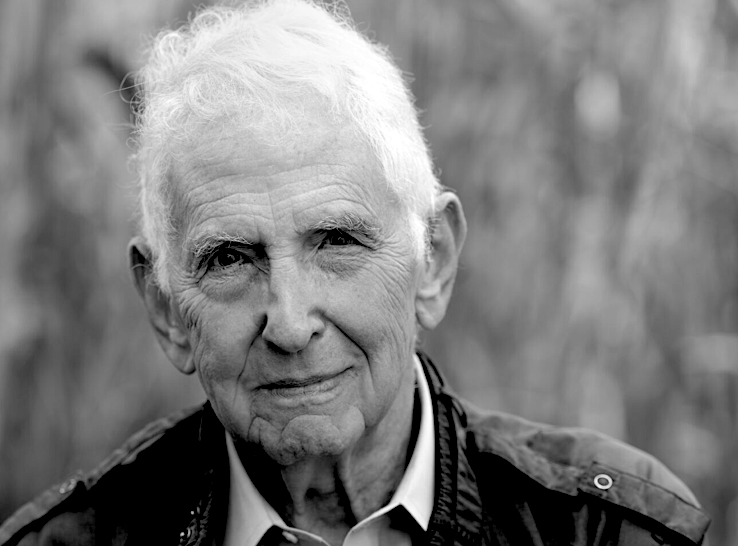
Daniel Ellsberg in 2020. (Christopher Michel, Wikimedia Commons, CC BY-SA 4.0)
By Craig Murray
CraigMurray.org.uk
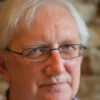 The massive obituaries to Daniel Ellsberg last weekend in both The New York Times and Washington Post were proof of the status he held in the United States.
The massive obituaries to Daniel Ellsberg last weekend in both The New York Times and Washington Post were proof of the status he held in the United States.
Only presidents get an obituary that size.
His name was not nearly so widely known in the U.K.
I first met Dan on 3 May 2006 when we were giving a joint presentation at Berkeley. The large hall was full to overflowing and to my surprise there were young students queuing outside and striving to listen on stairways through open doors.
The large majority of the audience were not born when Dan leaked the Pentagon Papers in 1971. But his star status endured.
I know the date because we went afterwards for a marvelous dinner at his Californian home, replete with excellent wine. We talked long into the night, and he signed — and dated — me a copy of his book Secrets, which tells the story of his path to whistleblowing on the lies that kept the Vietnam war going.
I am looking at his message now. It reads “To Craig Murray – with greatest admiration for your conscientious truth-telling! and looking forward to a friendship.”
In 2010 we were again on stage together in London, at a massively attended WikiLeaks press conference on the release of the Iraq War Logs. We jointly presented Julian Assange with his Sam Adams Award.
[Related: The Revelations of WikiLeaks: No. 3—The Most Extensive Classified Leak in History and WATCH: WikiLeaks Iraq War Logs: What It Means for Press Freedom]
It was at this event that I first realised that something had gone disastrously wrong in the relationship between WikiLeaks and The Guardian.
They had been cooperating closely, and I myself had published frequent articles in The Guardian over the previous four years. Arriving at the press conference, I ran into David Leigh, deputy editor of The Guardian, whom I viewed as a friend. We had lunch together a couple of times in the previous few months.
I said “Hello, David” and he simply stared at me. I thought he was lost in thought or somehow had not recognised me. I waved my hands in front of his eyes to get his attention. He stared at me, turned on his heel and walked away.
The Coverage Changed
It was from that day that The Guardian’s coverage of Assange entirely changed and he was treated as a bitter enemy — and that The Guardian became a servile channel for security service propaganda.
For me The Guardian smashing of the Snowden hard drives therefore came as no surprise. I had already witnessed them turn. David Leigh, incidentally, never spoke to me again and The Guardian stopped accepting my articles.
At the time of that press conference, the publication of Leigh and Luke Harding’s book on Assange — which gave away the location and password of the Chelsea Manning cache — was two months away, so it must already have been written.
 There had been a massive row among them all over Assange’s biography, which at that height of his fame was worth millions. Julian had decided he did not want The Guardian journalists involved after all, and I think a large part of the bitterness of the break was largely the sordid matter of money.
There had been a massive row among them all over Assange’s biography, which at that height of his fame was worth millions. Julian had decided he did not want The Guardian journalists involved after all, and I think a large part of the bitterness of the break was largely the sordid matter of money.
Which brings me at last to the thought behind this article.
Dan Ellsberg maintained until the last his “respectability” in society as the “good whistleblower.”
Yet the publication of papers from Chelsea Manning and others, similar in so many ways to Ellsberg’s Pentagon Papers, became demonised, then criminalised and Julian became the “bad whistleblower,” or more accurately publisher of whistleblowers.
Now Dan Ellsberg totally rejected this characterisation. It infuriated him and he actively fought against it, including at Julian’s extradition hearing, on which see below.
But how did this process of characterisation happen?
To me, the fundamental point is that the United States achieved consensus that the Vietnam war had been a terrible mistake. It was fought in the interests of colonialism, for the suppression of a nation, and was ultimately un-winnable.
Establishment Rejection of Vietnam War
The U.S. went through a cathartic rejection of the Vietnam War, which included recognition of the atrocities perpetrated by their armed forces on civilian populations. Portrayal of the Vietnam War, in Hollywood, in popular fiction, or in the “serious” media, portrayed it unflinchingly as a bungle and a disgrace; notably often relieved by comic treatment.
We have never really been through that process with the Iraq War. Although it is now generally accepted that the war was started on lies about Weapons of Mass Destruction, a very significant number of the political class — and quite possibly a majority of MPs, for example — do not accept that the Iraq War was a mistake.
There has been a serious failure to accept and process the fact of the numerous atrocities committed by British troops in both Iraq and Afghanistan.
In Oslo last week, Jeremy Corbyn told me that, when he stood up as Labour leader to apologise for the Iraq War, he was very conscious that he did not have the support of the vast majority of his own MPs.
It is extraordinary how many politicians, and how many high profile “journalists” cleave to the view that the Iraq War was justified because it saved the Iraqi people from a dreadful dictator. It killed or maimed millions, displaced millions more, blasted the entire infrastructure back 40 years, destroyed the economy, and set off unending civil war, but somehow the devotees of “liberal intervention” see all this as “better.”
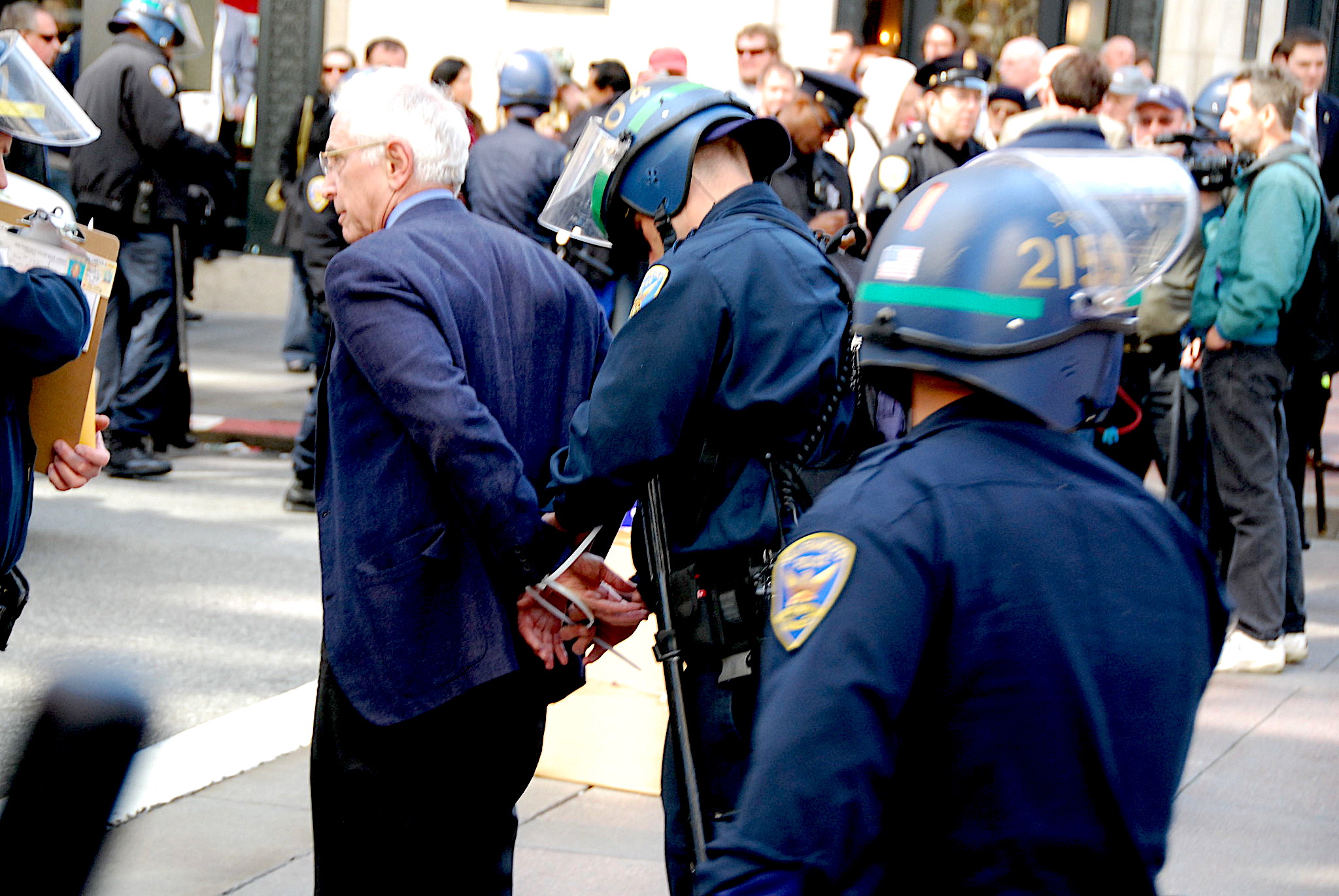
Daniel Ellsberg getting arrested at a protest against the Iraq War in San Francisco in March 2008. (Steve Rhodes/Flickr, CC BY-NC-SA 2.0)
Precisely the same, of course, can be said of Libya or Afghanistan or of Western-backed Saudi-organised wars in Syria or Yemen. Not only have those countries been completely devastated, the resultant mass refugee crisis has politically destabilised Europe.
Yet, astonishingly, there is no Establishment consensus that the attacks on the Middle East and Central Asia were a terrible mistake, in the same way that Vietnam is acknowledged as a terrible mistake. The doctrine of “liberal intervention” retains a deep hold on the political and media classes.
“Liberal intervention” of course, is simply “imperialism.” The notion that non-European people would be better off if their rulers were deposed and replaced by Western-mandated puppets is precisely how the British Empire worked. The justification was always the same – it was always for the good of the conquered people themselves.
The reason Dan Ellsberg attained a folk hero status denied to Assange, Snowden or Manning is that Vietnam has full Establishment acceptance as an error, but the 21st century invasions, interventions and the population mass surveillance are viewed as “justified.”
In the Assange hearing, counsel on behalf of the United States government openly stated that The New York Times could have been prosecuted under the Espionage Act for the publication of the Pentagon Papers, but that the U.S. executive had chosen not to do so. [CN: The prosecution lied as the Nixon DOJ did indeed impanel a grand jury in Boston to indict New York Times journalists. It collapsed after it became known the F.B.I. had been wiretapping Ellsberg’s phone, including his conversations with the journalists.]
6:30 A.M. Evidence by Video-Link
Let me tell you this of Daniel Ellsberg.
At the age of 89, Dan gave evidence in the Assange extradition hearing, by video-link. The court had scheduled his evidence at 2.30 p.m., which was 6.30 a.m. for Dan in California.
The defence applied for this to start later in the afternoon, given Dan’s age and the time. The court refused.
Support CN’s Spring
Fund Drive Today
Then consider this also. The court had only sent Ellsberg the “bundle” the previous day, giving him less than 24 hours to master 600 pages of documentation, before rising at 5.30 a.m. and getting ready to give evidence and be cross-examined.
This to an 89-year-old man.
Here is my eye witness account of Ellsberg’s subsequent testimony. I cannot do better to give you an idea of the man.
Re-reading it, I am still lost in admiration:
In the afternoon, the witness was Dan Ellsberg, doyen of whistleblowers. Born in Chicago in 1931, he was educated at Harvard and Cambridge. He served in the Marines from 1954–7, and from 1964–5 was special assistant to the U.S. secretary of defence. He was then involved in the making of an official classified 47-volume report entitled “History of Decision Making in Vietnam.”
Ellsberg briefly explained that the report showed that the war in Vietnam had been continued in the knowledge that it could not be won. It showed that both the public and Congress had repeatedly been lied to. He had leaked the report to lawmakers and then the public as “The Pentagon Papers.” This had resulted in the famous case on prior restraint on publication. There had also been a less well-known criminal case against him personally under the Espionage Act. This had been dismissed with prejudice by the court.
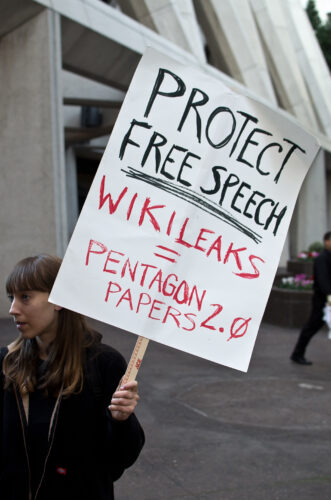
Protester in San Francisco, 2011. (Max Braun, Wikimedia Commons, CC BY-SA 2.0)
Asked by Edward Fitzgerald QC (counsel for Assange) to comment on the WikiLeaks/Manning publication on Afghanistan, Ellsberg replied that he saw extremely strong parallels with his own case. These papers had the capability of informing the public of the progress of the war and the limited possibility that it could be brought to a successful conclusion at all. The documents in the Afghan War Diary showed operational-level information, not a wider view, but the effect was similar. He strongly identified with both the source (Manning) and the process of publication.
Fitzgerald then asked Ellsberg whether Assange held political opinions relevant to this publication. Ellsberg said it was absurd for the prosecution to argue otherwise. He had himself been motivated by his political views in his publication and Assange’s views were very similar. He had held very interesting discussions with Assange and felt a great affinity with him. They both believed that there was a great lack of transparency to the public over government decisions. The public were fed much information that was false.
When the public had so little genuine information and were fed so much false information, real democracy was not possible. An example was the Iraq War, clearly an illegal war of aggression in breach of the U.N. charter, sold on lies to the public.
The documents in the Afghan War Diary were similar to low-level reports Ellsberg had himself written in Vietnam. It was the same thing; the invasion and occupation of a foreign country against the wishes of the majority of its population. That could only bring defeat or endless conflict: 19 years so far. The war logs had exposed a pattern of war crimes: torture, assassination and death squads. The one thing that had changed since Vietnam was that these things were now so normalised they were classified below Top Secret.
All the Pentagon Papers were Top Secret. None of the WikiLeaks documents were. They were not just below Top Secret, they had no restricted distribution classifications. This meant that, by definition, there should be nothing genuinely sensitive, and certainly not life-endangering, in papers of this classification.
Fitzgerald asked him about the Collateral Murder video. Ellsberg stated that it definitely showed murder, including the deliberate machine gunning of a wounded and unarmed civilian. That it was murder was undoubted. The dubious word was “collateral,” which implies accidental. What was truly shocking about it was the Pentagon reaction that these war crimes were within the Rules of Engagement. Which therefore permitted murder.
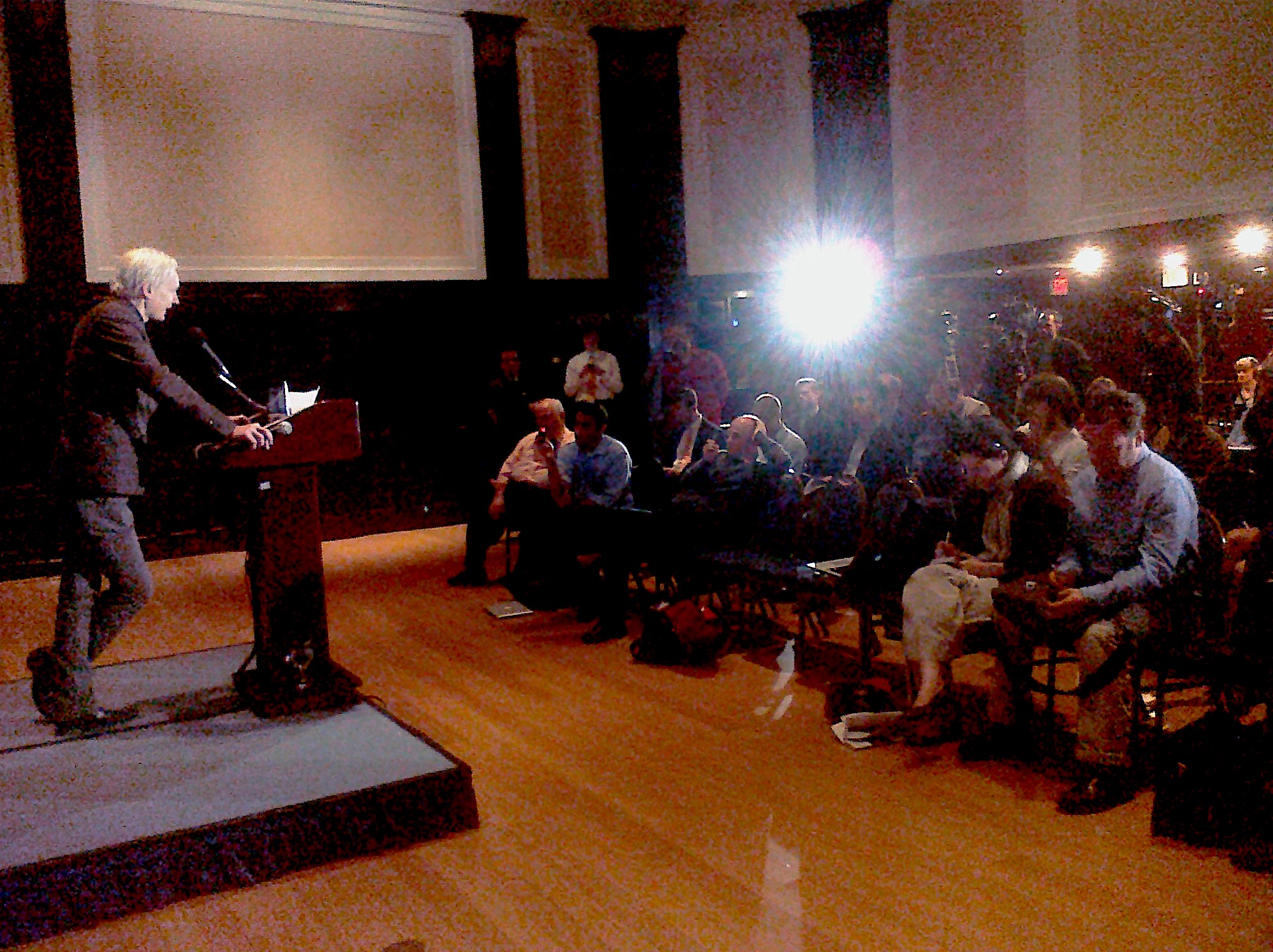
April 5, 2010: Julian Assange addressing National Press Club about WikiLeaks’ Collateral Damage video showing U.S. air attacks in Baghdad, Iraq, that killed civilians on July 12, 2007. (Jennifer 8. Lee, Flickr, CC BY 2.0)
Edward Fitzgerald asked whether Ellsberg was allowed to put forward the question of intention at his trial. He replied no, the distribution of classified material outside those designated to receive it was an offence of strict liability under the 1917 Espionage Act. This was absolutely inappropriate to trials of whistleblowers. “I did not get a fair trial and nor have recent whistleblowers in the USA. Julian Assange could not get a fair trial.”
Cross-examining for the U.S. government, James Lewis QC asked Ellsberg to confirm that at the time he copied the Pentagon Papers he was working for the Rand Corporation. He said yes. Lewis said that Assange was not being prosecuted for publication of the Collateral Murder video. Ellsberg said that the Collateral Murder video was essential to an understanding of the Rules of Engagement. Lewis countered that Assange was not being charged for publication of the Rules of Engagement. He was only being charged for publication of unredacted names of those who might come to harm.
Ellsberg replied that he had read the superseding indictment and that Assange was being charged with obtaining, receiving and possession of material including the Rules of Engagement and the Collateral Murder video, and all the documents. On publishing, he was only charged with the names. Lewis said the other charges related to conspiracy with Chelsea Manning. Ellsberg replied “Yes. They are still charges.”
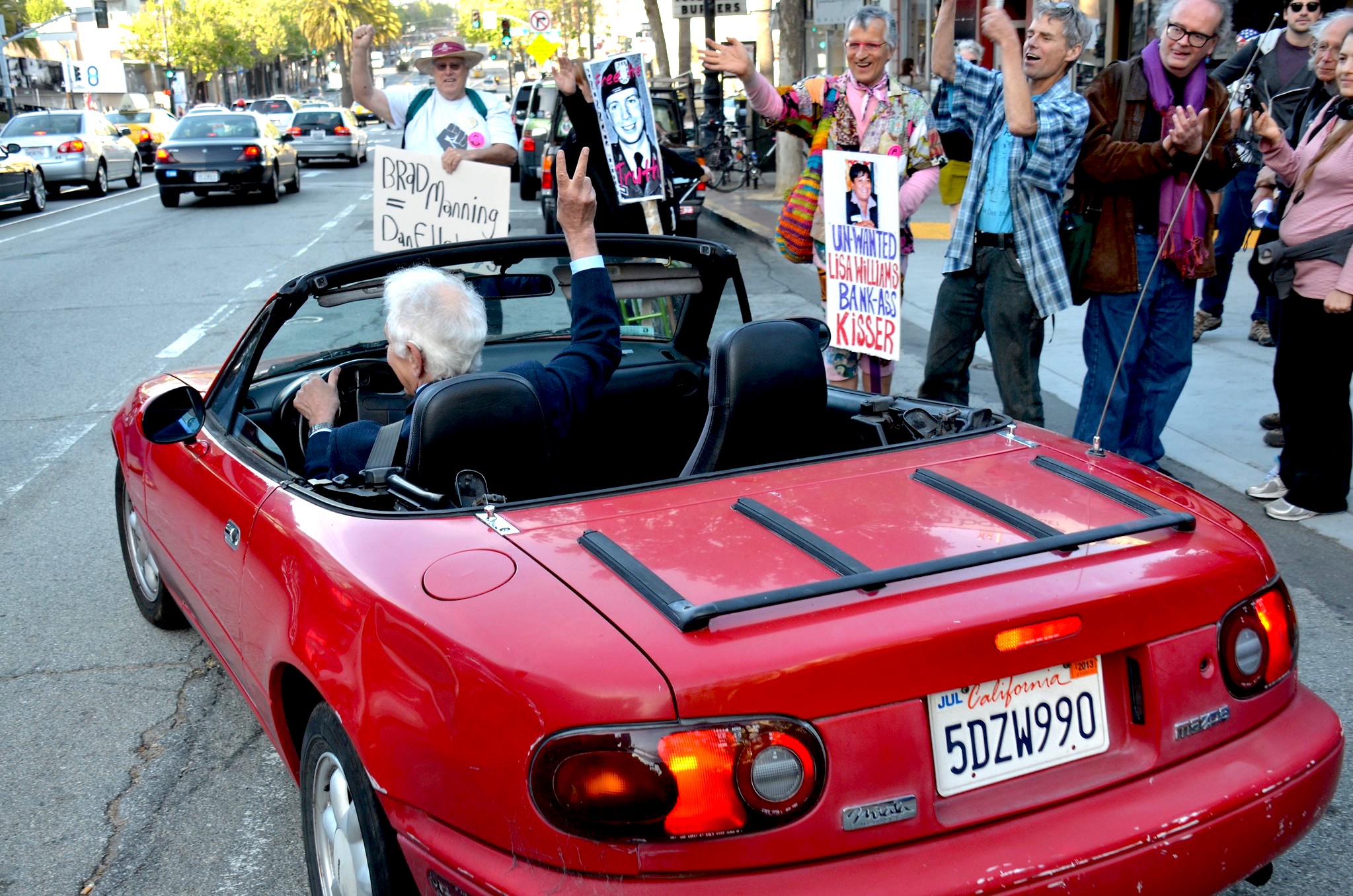
Daniel Ellsberg in red sports car at a protest to reinstate Chelsea Manning as San Francisco Pride Parade grand marshal in April 2013. (Steve Rhodes/Flickr, CC BY-NC-SA 2.0)
Lewis quoted U.S. Assistant Attorney Gordon Kromberg stating that prosecution was for documents up to Secret level containing the names of those “who risked their lives and freedom while helping the USA.” Lewis contrasted this with Ellsberg “when you published the Pentagon Papers you were very careful what you gave to the media.” Ellsberg replied that he withheld three or four volumes not to cause difficulties to diplomatic efforts to end the war.
Lewis suggested he was protecting individuals. Ellsberg said no; if he released those documents, the U.S. government might have used it as an excuse to exit diplomacy and continue the war. Lewis asked if there were names in the Pentagon Papers that would risk harm to them. Ellsberg replied yes. In one case, a clandestine C.I.A. agent was named, involved in the C.I.A. assassination of a major Vietnamese politician. He was a personal friend of Ellsberg and Ellsberg had thought hard about it, but had left him in.
Lewis Asked Ellsberg whether he had read the article “Why Wikileaks is Not the Pentagon Papers” by Floyd Abrams, who had represented The New York Times in the Pentagon Papers case. Ellsberg replied he had read several articles like this by Abrams. He did not know Abrams. He had only been involved in the civil case, not the criminal one. He had seen him once, at an awards ceremony long after.
Lewis said that Abrams had written that Ellsberg had withheld four volumes, whereas “can anyone doubt” that Assange would have published all of them?
Ellsberg replied he disagreed, Abrams had never had one minute of discussion with him or Assange. “He does not understand my motives at all in his article.” The position he outlines is widely held by those who want to criticise Julian Assange, Chelsea Manning and Edward Snowden while pretending to be liberal.
What he writes is simply untrue. Julian Assange withheld 15,000 files. He went through a long, hard process of redaction. He requested help from both the State Department and Department of Defense on redaction. I have no doubt Julian would have removed the volumes as I did, in my place. He had no intention to name names.
Ellsberg continued that 10 years later, the U.S. government has still not been able to name one single individual who was actually harmed by the WikiLeaks releases. “I was shocked that Kromberg should make that allegation while offering no evidence. As nobody was hurt, clearly the risk was never as high as they claimed — as indeed the document classification would tell you.”
“They said exactly the same of me. They said C.I.A. agents and those helping the USA would be hurt. They said I would have blood on my hands.”
There now followed an extraordinary “question” from James Lewis QC who was permitted to read out about 11 paragraphs from various locations in one of Kromberg’s rambling affidavits, in which Kromberg said that as a result of WikiLeaks publication, some U.S. sources had had to leave their homeland, go into hiding, or change their names, in a number of countries, including Afghanistan, Iraq, Iran, Syria, Libya, China and Ethiopia.
Some individuals in Afghanistan and Iraq had subsequently disappeared. The Taliban were on record as saying that those who cooperated with U.S. forces would be killed. One Ethiopian journalist was forced to flee Ethiopia after being named as a U.S. source. The U.S. embassy in China reported threats had been made against some of their named Chinese sources. WikiLeaks material was found in the possessions of Osama Bin Laden after he was shot.
Lewis asked in a furious voice “How can you possibly, honestly say that nobody was harmed?”
Ellsberg: With all these people who felt they were in danger, of course I am sorry it was inconvenient for them, and that is regrettable. But was any one of them actually physically harmed? Did one of them actually suffer the claimed physical consequences?
Lewis: You call it regrettable that people were put at risk. Is it your position that there was absolutely no harm caused by the publication of the names of these individuals?
Ellsberg: Assange’s actions are absolutely antithetical to the notion that he deliberately published these names. Had hundreds been harmed, that would count against the great good done by publication of the information. No evidence is produced that any actual harm came to them.
But this has to be put in the context of the policies which Assange was trying to change, invasions that led to 37 million refugees and 1 million deaths.
Of course some people could not be located again in a war that killed a million people and displaced 37 million. The government is extremely hypocritical to pretend a concern for them against their general contempt for Middle Eastern lives. They had even refused to help redact the names. This is a pretense at concern.
Lewis: What about the disappeared? Is it not common sense that some had been forced to disappear or flee under another name?
Ellsberg: It does not seem to me that that small percentage of those named who may have been murdered or fled, can necessarily be attributed as a result of WikiLeaks, when they are in among more than 1 million who have been murdered and 37 million who have fled.
Lewis then asked Ellsberg if it was true he had held an encrypted back up copy of the Manning material for Assange. Ellsberg replied it was; it had subsequently been physically destroyed.
In re-examination, Fitzgerald took Ellsberg to a passage in the Kromberg affidavit which stated that the U.S. government could not positively attribute any death to the WikiLeaks material. Ellsberg said that was his understanding, and had been said at the Manning trial.
He was shocked. It was just like Iraqi WMD. He had at first been inclined to believe the government on Iraqi WMD, just as he had first been inclined to believe the government on deaths caused by WikiLeaks releases. In both cases it had proved they were making it up.
I hope that gives you an idea of the intellectual and moral stature and the incredible resilience of my friend Daniel Ellsberg. I will never forget that sparkling moment when, having been given almost no chance to prepare and so early in the morning, he corrected in detail the counsel for the U.S. government on the contents of the second superseding indictment!
It was an incredible honour just to have known him.
Craig Murray is an author, broadcaster and human rights activist. He was British ambassador to Uzbekistan from August 2002 to October 2004 and rector of the University of Dundee from 2007 to 2010. His coverage is entirely dependent on reader support. Subscriptions to keep this blog going are gratefully received.
This article is from CraigMurray.org.uk.
The views expressed are solely those of the author and may or may not reflect those of Consortium News.
Support CN’s Spring
Fund Drive Today



PROJECT FREEDOM OF SPEECH
Continue freely speaking out against prejudicial presumptuous prosecutorial power!
The system is broken. The focus is on attention-getting and not on a commitment to solving the continuing problem of purposeful deception. Who can fix it? Can you?
Facsinating. The anecdote about David Leigh is particularly revealing.
Both David Leigh and Luke Harding are the lowest of worms. It’s just that simple. And Harding continues to be employed by The Guardian. What a piece of filth he is.
Craig Murray was betrayed by David Leigh, whom Craig thought was a friend, but who then treated him as persona non grata.
It is bad enough when a friend is replaced by a completely different person who is not a friend. It is even worse when one is treated as persona non grata by somebody whom one thought was a friend.